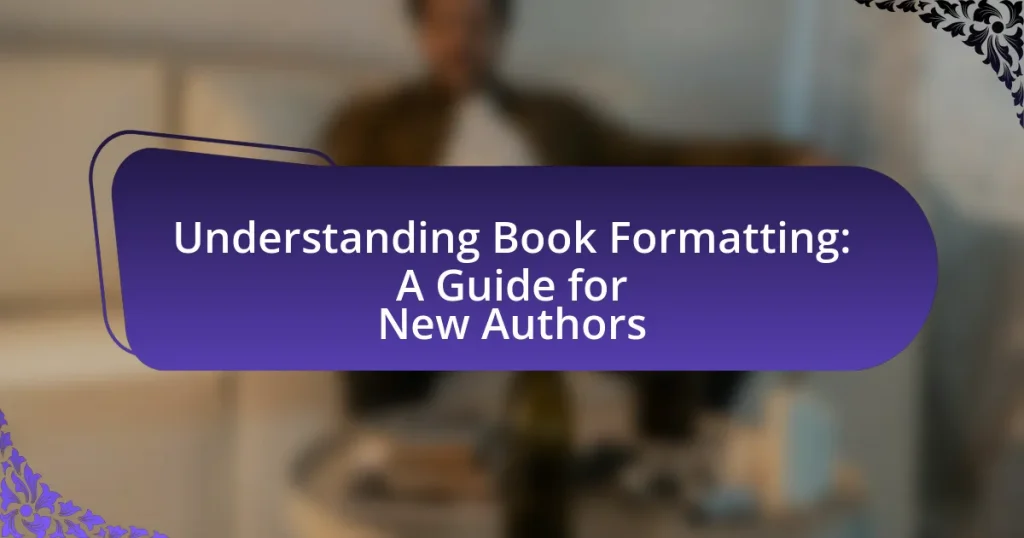The article focuses on essential tips for setting up a successful author website, emphasizing key elements such as professional design, engaging author bios, and effective content strategies. It outlines the importance of showcasing an author’s work through a well-structured portfolio, maintaining a blog for audience engagement, and ensuring clear contact information for networking. Additionally, the article discusses the significance of user experience, branding, and SEO practices in driving traffic and enhancing visibility. It also highlights common pitfalls to avoid and best practices for maintaining an updated and relevant online presence.

What are the essential elements of a successful author website?
A successful author website must include a professional design, an engaging author bio, a portfolio of works, a blog or news section, and clear contact information. Professional design ensures that the website is visually appealing and user-friendly, which can enhance the author’s credibility. An engaging author bio provides visitors with insight into the author’s background and writing style, fostering a personal connection. A portfolio of works showcases the author’s publications, allowing potential readers to explore their writing. A blog or news section keeps the audience updated on new releases and events, encouraging repeat visits. Clear contact information facilitates communication with readers, publishers, and media, which is essential for networking and promotional opportunities. These elements collectively contribute to a website’s effectiveness in attracting and retaining an audience.
How can an author effectively showcase their work online?
An author can effectively showcase their work online by creating a professional website that highlights their writing portfolio, provides easy access to their published works, and engages with their audience through a blog or newsletter. A well-designed website serves as a central hub for an author’s brand, allowing potential readers to explore their books, read excerpts, and learn about upcoming projects. According to a survey by the Author’s Guild, 80% of authors reported that having a personal website significantly increased their visibility and sales. This demonstrates that a dedicated online presence is crucial for authors aiming to reach a wider audience and establish their credibility in the literary market.
What types of content should be included on an author website?
An author website should include a biography, a portfolio of published works, a blog or news section, contact information, and links to social media. The biography provides readers with background information about the author, establishing credibility and connection. The portfolio showcases the author’s published works, allowing potential readers to explore their writing style and themes. A blog or news section keeps the audience updated on new releases, events, or insights into the writing process, fostering engagement. Contact information enables readers, publishers, or agents to reach out easily. Lastly, links to social media platforms help build a community and expand the author’s reach.
How can authors highlight their writing style and genre?
Authors can highlight their writing style and genre by incorporating specific elements on their websites, such as showcasing excerpts from their works, using genre-specific visuals, and maintaining a consistent tone throughout their content. For instance, including sample chapters or passages allows visitors to experience the author’s voice directly, while genre-specific imagery can visually communicate the themes and mood associated with their writing. Additionally, a well-crafted author bio that reflects their unique style and influences can further establish their identity within a particular genre.
Why is user experience important for an author website?
User experience is crucial for an author website because it directly influences visitor engagement and retention. A well-designed user experience ensures that visitors can easily navigate the site, find information about the author and their works, and engage with content, which can lead to increased book sales and a loyal readership. Research indicates that 88% of online consumers are less likely to return to a site after a bad experience, highlighting the importance of a positive user experience in maintaining audience interest and fostering a community around the author’s brand.
What design principles should authors consider for their website?
Authors should consider usability, aesthetics, and responsiveness as key design principles for their website. Usability ensures that visitors can easily navigate the site, find information, and engage with content, which is supported by research indicating that 88% of online users are less likely to return to a site after a bad experience. Aesthetics involve creating a visually appealing layout that reflects the author’s brand and genre, as studies show that first impressions are formed within 50 milliseconds, heavily influencing user engagement. Responsiveness guarantees that the website functions well on various devices, with mobile traffic accounting for over 50% of global web traffic, highlighting the necessity for a mobile-friendly design.
How can navigation impact visitor engagement on an author website?
Effective navigation significantly enhances visitor engagement on an author website by facilitating easy access to content. When visitors can quickly find information about the author’s works, biography, and contact details, they are more likely to stay longer and explore more pages. Research indicates that websites with intuitive navigation can increase user retention by up to 50%, as users are less frustrated and more inclined to interact with the content. Therefore, a well-structured navigation system directly correlates with improved visitor engagement metrics, such as time spent on site and page views.
What role does branding play in an author website’s success?
Branding is crucial for an author website’s success as it establishes a unique identity that resonates with the target audience. A strong brand helps differentiate the author from competitors, fostering recognition and loyalty among readers. For instance, consistent use of visual elements, such as logos and color schemes, alongside a coherent voice in content, can enhance the overall user experience. Research indicates that 77% of consumers make purchases based on brand loyalty, highlighting the importance of effective branding in driving engagement and sales for authors.
How can authors create a cohesive brand identity online?
Authors can create a cohesive brand identity online by establishing a consistent visual and verbal style across all platforms. This includes using the same color palette, typography, and logo on their website and social media profiles, which helps in creating a recognizable image. Additionally, authors should maintain a uniform tone and voice in their writing, whether in blog posts, social media updates, or newsletters, to reinforce their personality and message. Research indicates that consistent branding can increase customer recognition by up to 80%, highlighting the importance of a unified approach in building an author’s online presence.
What elements contribute to effective branding for authors?
Effective branding for authors is primarily influenced by a clear author identity, consistent messaging, and audience engagement. A clear author identity involves defining a unique voice and style that resonates with the target readership, which helps in establishing a recognizable presence. Consistent messaging across all platforms, including social media and websites, reinforces the author’s brand and ensures that readers receive a cohesive experience. Audience engagement, through interactive content and personal connections, fosters loyalty and encourages word-of-mouth promotion. These elements collectively enhance an author’s visibility and marketability in a competitive literary landscape.

How can authors drive traffic to their website?
Authors can drive traffic to their website by utilizing search engine optimization (SEO) techniques, engaging in social media marketing, and creating valuable content. SEO helps improve website visibility on search engines, making it easier for potential readers to find the author’s site. For instance, optimizing keywords related to the author’s genre can increase organic search traffic. Social media platforms allow authors to connect with their audience, share updates, and promote their work, which can lead to increased website visits. Additionally, producing high-quality blog posts, articles, or resources relevant to their audience can attract visitors and encourage them to return for more content. According to a study by HubSpot, companies that prioritize blogging are 13 times more likely to see a positive ROI, demonstrating the effectiveness of content marketing in driving traffic.
What strategies can authors use for effective SEO?
Authors can use keyword optimization, quality content creation, and backlink building for effective SEO. Keyword optimization involves researching and incorporating relevant keywords into titles, headings, and throughout the content to improve search engine visibility. Quality content creation focuses on producing engaging, informative, and original content that meets the needs of the target audience, which can lead to higher user engagement and lower bounce rates. Backlink building entails acquiring links from reputable websites, which enhances domain authority and improves search rankings. According to a study by Moz, backlinks are one of the top factors influencing search engine rankings, highlighting the importance of this strategy.
How do keywords influence search engine rankings for author websites?
Keywords significantly influence search engine rankings for author websites by determining how well the site matches user search queries. When authors strategically incorporate relevant keywords into their website content, meta tags, and headings, search engines can better understand the site’s focus and relevance to specific topics. Research indicates that websites optimized for targeted keywords can achieve higher visibility in search results, leading to increased organic traffic. For instance, a study by Moz found that keyword optimization is a critical factor in ranking algorithms, directly impacting the likelihood of a website appearing on the first page of search results.
What are the best practices for optimizing content for search engines?
The best practices for optimizing content for search engines include using relevant keywords, creating high-quality content, optimizing meta tags, and ensuring mobile-friendliness. Relevant keywords should be strategically placed in titles, headings, and throughout the content to improve visibility. High-quality content that provides value to readers encourages engagement and reduces bounce rates, which positively impacts search rankings. Optimizing meta tags, including title tags and meta descriptions, helps search engines understand the content and improves click-through rates. Additionally, ensuring that the website is mobile-friendly is crucial, as over 50% of global web traffic comes from mobile devices, according to Statista. These practices collectively enhance search engine optimization (SEO) and improve the chances of ranking higher in search results.
How can social media enhance an author’s online presence?
Social media enhances an author’s online presence by providing platforms for direct engagement with readers and promoting their work. Authors can share updates, interact with fans, and participate in discussions, which fosters a community around their writing. According to a 2021 survey by the Author Earnings Report, 70% of authors who actively use social media reported increased visibility and sales of their books. This demonstrates that strategic use of social media can significantly amplify an author’s reach and influence in the literary market.
Which social media platforms are most beneficial for authors?
The most beneficial social media platforms for authors are Facebook, Twitter, Instagram, and LinkedIn. Facebook allows authors to create dedicated pages for their work, engage with readers through groups, and share updates, which can lead to increased visibility and community building. Twitter is effective for real-time engagement, networking with other authors, and participating in writing-related conversations through hashtags. Instagram, with its visual focus, is ideal for authors to showcase book covers, share behind-the-scenes content, and connect with readers through storytelling. LinkedIn serves as a professional networking platform where authors can connect with industry professionals, share articles, and establish their expertise. These platforms collectively enhance an author’s reach, engagement, and professional presence in the literary community.
How can authors integrate social media with their website?
Authors can integrate social media with their website by embedding social media feeds, adding share buttons, and linking to their profiles. Embedding social media feeds allows visitors to see real-time updates and engage with content directly on the website, enhancing user interaction. Adding share buttons enables readers to easily share blog posts or book information on their social platforms, increasing visibility. Linking to social media profiles encourages visitors to follow the author for updates, fostering a community around their work. These strategies collectively enhance engagement and drive traffic between the author’s website and social media platforms.
What are the benefits of building an email list for authors?
Building an email list provides authors with direct access to their audience, enabling effective communication and engagement. This direct line allows authors to share updates, promote new releases, and offer exclusive content, fostering a loyal reader base. Research indicates that email marketing has an average return on investment of $42 for every dollar spent, highlighting its effectiveness in driving sales and reader engagement. Additionally, authors can segment their audience based on interests, allowing for targeted messaging that increases the likelihood of conversion and reader retention.
How can authors effectively collect email subscribers?
Authors can effectively collect email subscribers by offering valuable incentives, such as exclusive content, free e-books, or newsletters. These incentives encourage visitors to provide their email addresses in exchange for something beneficial. Research indicates that 70% of consumers prefer to receive promotional content through email, highlighting the effectiveness of email marketing. Additionally, implementing sign-up forms prominently on the author’s website, utilizing pop-ups, and integrating subscription options on social media platforms can significantly increase subscriber rates.
What types of content should authors share with their email list?
Authors should share a variety of content with their email list, including updates on new book releases, exclusive excerpts, behind-the-scenes insights, writing tips, and personal anecdotes. This diverse content keeps readers engaged and fosters a sense of community. For instance, sharing exclusive excerpts can create anticipation for upcoming releases, while writing tips can provide value to aspiring authors. Additionally, personal anecdotes help to build a connection between the author and their audience, enhancing reader loyalty.

What are the common pitfalls to avoid when setting up an author website?
Common pitfalls to avoid when setting up an author website include neglecting mobile optimization, failing to create engaging content, and overlooking SEO best practices. Mobile optimization is crucial as over 50% of web traffic comes from mobile devices; a non-responsive design can lead to high bounce rates. Engaging content is essential because it keeps visitors on the site longer and encourages them to return; without it, potential readers may lose interest. Additionally, ignoring SEO can severely limit visibility; according to a study by HubSpot, 75% of users never scroll past the first page of search results, making it vital to implement effective keywords and meta descriptions.
What mistakes do authors often make with their website design?
Authors often make the mistake of prioritizing aesthetics over functionality in their website design. This can lead to complex navigation, slow loading times, and a lack of clear calls to action, which ultimately frustrates visitors. For instance, a study by Google found that 53% of mobile users abandon sites that take longer than three seconds to load, highlighting the importance of speed and usability. Additionally, many authors neglect mobile optimization, which is critical as over half of web traffic comes from mobile devices. By focusing on these aspects, authors can create a more effective and user-friendly website.
How can cluttered layouts detract from an author’s message?
Cluttered layouts can significantly detract from an author’s message by overwhelming the reader and obscuring key information. When a website is visually chaotic, it distracts visitors from the content, making it difficult for them to focus on the author’s intended message. Research indicates that users typically spend only a few seconds on a webpage before deciding whether to stay or leave; thus, a cluttered design can lead to higher bounce rates and reduced engagement. A study by the Nielsen Norman Group found that users prefer clean, organized layouts, which enhance readability and comprehension. Therefore, a cluttered layout not only hinders effective communication but also diminishes the overall user experience, ultimately undermining the author’s ability to connect with their audience.
What are the risks of neglecting mobile optimization?
Neglecting mobile optimization can lead to significant risks, including decreased user engagement and higher bounce rates. When websites are not optimized for mobile devices, users often experience slow loading times and difficult navigation, which can result in frustration and abandonment of the site. According to Google, 53% of mobile users abandon sites that take longer than three seconds to load. Additionally, a lack of mobile optimization can negatively impact search engine rankings, as Google prioritizes mobile-friendly sites in its search results. This can lead to reduced visibility and traffic, ultimately affecting an author’s ability to reach their audience effectively.
How can authors ensure their website remains updated and relevant?
Authors can ensure their website remains updated and relevant by regularly publishing new content and engaging with their audience. Consistent updates, such as blog posts, articles, or news about upcoming books, keep the website dynamic and encourage repeat visits. Additionally, authors should monitor website analytics to understand visitor behavior and preferences, allowing them to tailor content accordingly. Research indicates that websites with fresh content can improve search engine rankings, making them more visible to potential readers. Regularly updating the website not only enhances user experience but also establishes the author as an active participant in their literary community.
What content should be regularly refreshed on an author website?
Regularly refreshed content on an author website should include blog posts, book updates, event announcements, and author news. Blog posts keep the audience engaged and informed about relevant topics, while book updates provide information on new releases or changes to existing works. Event announcements inform readers about upcoming signings, readings, or speaking engagements, and author news shares personal milestones or achievements that can strengthen the connection with the audience. Keeping this content current enhances user engagement and improves search engine optimization, making the website more visible to potential readers.
How can authors stay informed about web design trends?
Authors can stay informed about web design trends by regularly following industry blogs, subscribing to newsletters, and participating in online forums. Websites like Smashing Magazine and A List Apart provide insights into the latest design practices and technologies. Additionally, attending web design conferences and webinars can offer firsthand knowledge from experts in the field. Research indicates that 70% of web designers believe that staying updated with trends is crucial for creating effective websites, highlighting the importance of continuous learning in this area.
What are the best practices for maintaining an author website?
The best practices for maintaining an author website include regularly updating content, ensuring mobile responsiveness, optimizing for search engines, and engaging with visitors through a blog or newsletter. Regular content updates keep the website relevant and encourage return visits, while mobile responsiveness is crucial as over 50% of web traffic comes from mobile devices. Search engine optimization (SEO) enhances visibility, making it easier for potential readers to discover the author’s work. Engaging with visitors through a blog or newsletter fosters a community and keeps the audience informed about new releases and events. These practices collectively enhance user experience and promote the author’s brand effectively.
How often should authors review their website’s performance?
Authors should review their website’s performance at least once a month. Regular monthly reviews allow authors to track key metrics such as traffic, engagement, and conversion rates effectively. According to a study by HubSpot, businesses that analyze their website performance monthly can identify trends and make timely adjustments, leading to a 20% increase in overall effectiveness. This frequency ensures that authors stay informed about their audience’s behavior and can optimize their content and marketing strategies accordingly.
What tools can authors use to monitor website analytics?
Authors can use tools like Google Analytics, Matomo, and Clicky to monitor website analytics. Google Analytics provides comprehensive data on website traffic, user behavior, and conversion tracking, making it a widely used choice among authors. Matomo offers similar features with a focus on data privacy, allowing authors to host their analytics data on their own servers. Clicky provides real-time analytics and user-friendly dashboards, which can be particularly beneficial for authors looking for immediate insights into their website performance. These tools are validated by their widespread adoption and effectiveness in tracking and analyzing web traffic.



